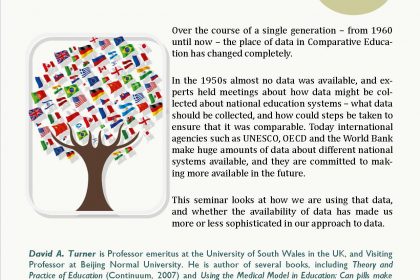Comparison is a fundamental tool for all forms of enquiry. When applied to education in an international setting, it assists in identification of factors which shape education systems, processes and outcomes, and instruments for improvement of those systems, processes and outcomes. The comparisons in this specialism will be framed by theories and understandings of the forces of globalisation. These forces bring benefits for many people, but can also have negative dimensions. This specialism will examine experiences through the lens of globalisation, identifying forces of continuity and change and the implications for educators. It will also focus on the nature of development in an international context and on the role of education in the processes of development. This will include analysis of all levels of formal education (early childhood to higher education), and various types of nonformal education. It will include particular reference to UNESCO’s Education for All (EFA) objectives in the context of the Millennium Development Goals (MDGs).
Who would benefit from this specialism?
• Teachers and educators with an interest in comparative education and in international educational development in the context of an increasingly globalized world.
• Persons who have completed their undergraduate studies in related themes and who are keen to proceed with deeper study of links between education and development
• Future or current development workers (NGOs, international organisations, bilateral organisations etc.) with an interest in education and capacity building.
Mode of study:
To be available on part-time and full-time mode (for 2-year part-time study or 1-year full-time study)
Outline of four Specialist Modules:
Module 1: Themes and approaches inthe field of comparative education
This module will introduce students to the history and nature of comparative education as a field of enquiry. It will note the principal dimensions of the field as conventionally defined in the literature on the topic, and will consider some variations in emphasis in scholarly communities and other actors in different parts of the world. The module will also consider the nature and contents of some key vehicles for publishing comparative education research, including journals, books and reports by international agencies. The module will conclude with an overview of the nature and directions of the field. Assessment: 100% coursework.
Module 2: Addressing the global-local nexus in education
This module will develop students’ understandings of both local and global education policies and practices. Adopting a ‘glocalisation’ perspective, it will stress a new localism that stands as an act of resistance against globalisation and rootlessness to reclaim the significance of the local in the global age. Drawing on local experiences and phenomena as a source of learning, this module will introduce students to an understanding of education that is conscious of local places to enable them to be inducted into the knowledge and patterns of behaviour associated with responsible community engagement. Assessment: 100% coursework.
Module 3: Education for sustainable development venture lab
This module will examine dimensions of education for sustainable development in Hong Kong, Mainland China, and the world. We are currently just over half way through the United Nations Decade of Education for Sustainable Development (2005-2014). The aim of the decade, according to UNESCO, is “to integrate the principles, values, and practices of sustainable development into all aspects of education and learning, in order to address the social, economic, cultural and environmental problems we face in the 21st century”. This module will focus on issues of poverty, sustainability and development, enabling students to develop broader perspectives and understanding. The module will foster a consciousness of being part of a global society, and identify conceptual and practical implications. Assessment: 100% coursework.
Module 4: Critical issues in educational reform
This module will enable students to employ theoretical perspectives and empirical research findings to better understand critical issues in contemporary educational reform in East Asia and elsewhere. The module will address the nature and evolution of globalization as a key context in which contemporary educational reform takes place. Identifying links between globalization and educational reform, the module will provide a set of cases for developing students’ understanding and knowledge of educational reform from a comparative perspective. Assessment: 100% coursework.
In addition to four specialist modules, students will also have to complete: ¾ a research methods course “Methods of Research and Enquiry” (2 modules equivalent); plus ¾ either an option of one elective module and a DISSERTATION (3 modules equivalent), or an option of three elective modules and a PROJECT by Independent Study (1 module equivalent).
















